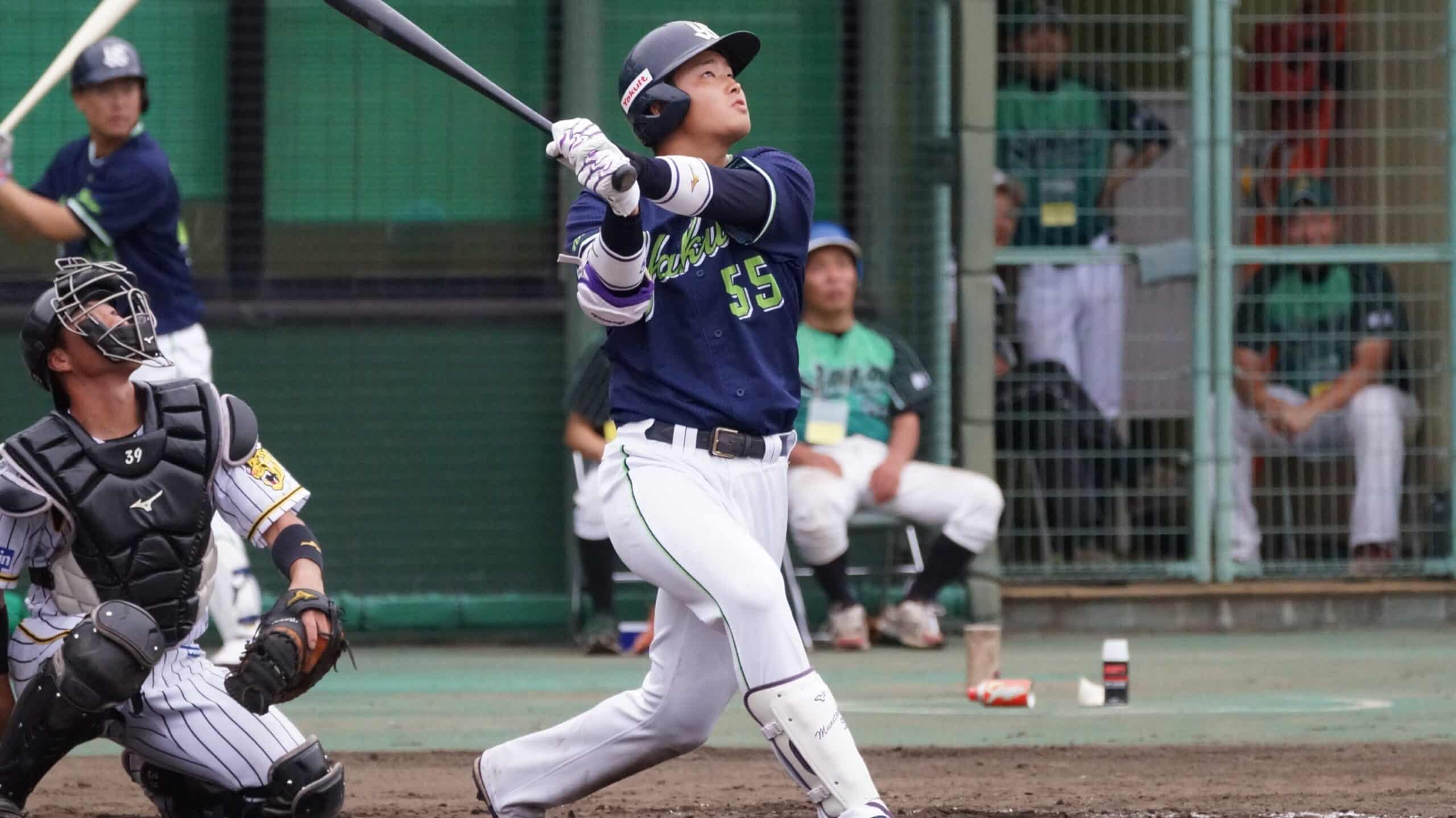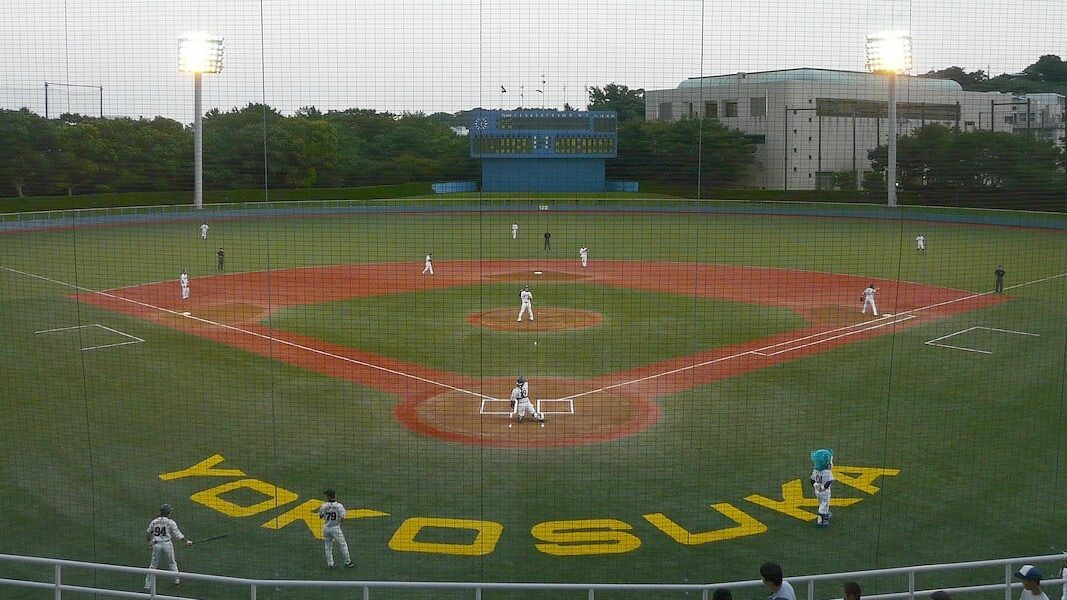
There is a common misconception that Japan doesn’t have minor-league baseball. This couldn’t be further from the truth. True, the Japanese minor league structure is not as full-fledged as America’s, with 120 clubs affiliated with Major League Baseball and numerous independent leagues across the continent. But Japan has no shortage of professional, semi-pro, and amateur baseball beyond its top competition level, Nippon Professional Baseball, which is recognized as a major league (with a lowercase M).
Compared to a typical minor or independent league game in the US, where promotional days, fun mascots, and family entertainment are to be expected, the focus in Japan is on the sport. Baseball is always at the front and center of the experience, making these games best suited for hardcore fans who are keen on watching for the quality competition, prospects, or simply love of the game. At all levels of Japanese minor league baseball, players give everything to win, and the local fans are invested in the team’s success.
Japanese minor league teams can be divided into three categories: Farm, Industrial, and Independent. Let’s take a look at each one!
NPB-Affiliated Farm Teams
Farm teams are directly affiliated with their respective NPB clubs and function like a cross between Rookie Ball and Triple-A for MLB organizations; players range from recently drafted prospects to veteran journeymen to rehabbing stars, so competition for playing time is intense. Every NPB club has at least one farm team, known as the “ni-gun” or “second team,” with five teams having multiple farm teams. These teams use the same name and uniforms as their NPB counterparts and function as a reserve roster for the “ichi-gun” or “first team.”

It’s typical for top college prospects to skip the minor league level entirely, but most high school players will spend at least a few seasons on the farm before getting a shot in NPB. Their stadiums are generally located close to the parent team, such as the Hanshin Tigers’ farm in Nishinomiya (just ten miles from Kobe) or the DeNA Baystars farm in Yokosuka (a half-hour drive from Yokohama). Most stadiums can hold thousands of people but don’t typically see more than a couple hundred for regular season games.
The NPB farm circuit is split into two divisions, the Western League and Eastern League. Up until this year, each league had an odd number of teams but will now feature an even-numbered six and eight clubs, respectively, thanks to a pair of expansion teams for 2024. The new clubs — Kufu Hayate Ventures Shizuoka and Niigata Albirex — will be the only non-NPB affiliates in the leagues and largely consist of former NPB players and independent leaguers. In total, they play 132 regular season games (NPB plays 143), and the winners of each league meet at the end of the year for a single Farm Championship Game.
Some larger NPB organizations with better finances and facilities, like the SoftBank Hawks and Yomiuri Giants, have more than one farm team. In recent years, more teams like the Orix Buffaloes and Seibu Lions have also opened a third division. They tend to contain younger ikusei or developmental projects outside of an NPB 70-man roster and play against non-affiliate or college teams for most of the year. Kodai Senga is the most prominent player who has blossomed from an ikusei player in the lower minors into a superstar, but this may become more common, especially as some NPB teams have started to compete with MLB for international amateur prospects in recent years.
JABA Industrial League
Industrial Leagues are one of the most important components of the Japanese baseball ecosystem and are referred to as “shakaijin yakyu” or “worker baseball.” Players in these leagues, operated by the Japanese Amateur Baseball Association (JABA), either play for independent club teams or simultaneously work as employees of a company and participate on that company’s sponsored baseball team. But this is no casual rec-league softball like you see in the US!
Though salaries are determined on a case-by-case basis, players are paid to play. Depending on their ability, a player may be a full-time employee at the company and play baseball alongside regular work or sign a specific contract as a baseball player, with their salary depending on their on-field performance. Typically, full-time employees will be assigned a standard job for the company in addition to playing baseball on behalf of the company. There have even been stories of players finding out they were drafted to NPB while actively working their day jobs!
As such, the industrial leagues allow aspiring pros to work a regular job while doing what they truly love. Legends like Hideo Nomo (Nippon Steel) and Kosuke Fukudome (Nippon Life), as well as current stars like Koji Chikamoto (Osaka Gas) and Ryoji Kuribayashi (Toyota), are all industrial league products. Before the 2023 World Baseball Classic, Miyazaki Umeda, a team composed of driving school employees, played exhibitions against Team China and the Czech Republic and even won a game. These guys can absolutely play ball.
For some smaller companies, if they struggle to make a profit, the baseball operations may fold, potentially ending a player’s career, though their employment at the company could still persist. Top corporate teams include car conglomerates like Toyota, Honda, and Mitsubishi and gas companies like ENEOS and Osaka Gas. They compete in sub-leagues and inter-city tournaments year-round, culminating in the Japan Amateur Baseball Championship in fall. While attendance figures at these games are difficult to find, broadcasts indicate the final rounds of big tournaments can draw several thousand fans, complete with oendan, or organized cheering sections, including cheerleaders and musical instruments.
IPBL Independent League
The final type of minor league in Japan are “Dokuritsu” or Independent Leagues, organized by the Japan Association of Independent Professional Baseball Leagues (IPBL). Independent leagues function similarly to their American counterparts, with the added benefit of being NPB draft-eligible. Current active leagues include the Shikoku Island League Plus, Baseball Challenge League, Kansai Independent Baseball League, Hokkaido Baseball League, Hokkaido Frontier League, Kyushu Asia League, Bayside League, and the Nihonkai League. These teams rely on sponsors to keep running, so their uniforms and fields are typically covered with sponsorships. MLB fan-favorite Munenori Kawasaki, now 42 years old, currently plays for the Tochigi Golden Braves of the Baseball Challenge League.
The number of games per season depends on the club, but teams are not restricted to playing their own league. For instance, the four teams in the Shikoku Island League Plus play not only each other but also colleges, industrial teams, and even lower NPB affiliates like the SoftBank Hawks’ third and fourth teams.
Winners from several of the top leagues compete in a single-elimination tournament at the conclusion of the season in the Independent League Grand Championship. In 2023, the Hinokuni Salamanders, who were founded just three years ago and briefly managed by NPB legend Bobby Rose, were crowned Independent League champions. While decentralized in structure, Independent leagues are unified in bringing baseball to rural communities and providing players with the opportunity to pursue their goal of going to NPB.
Farm, Industrial, and Independent league games may only draw 1/100th of an NPB game in terms of attendance, but their significance, impact, and value in promoting baseball can’t be quantified by numbers!


